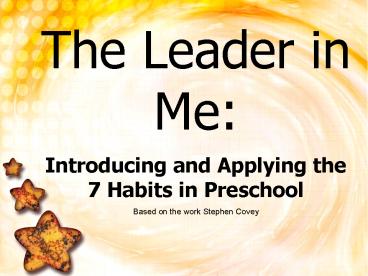The Seven Habits of Highly Effective People PowerPoint PPT Presentation
Title: The Seven Habits of Highly Effective People
1
The Leader in Me Introducing and Applying the 7
Habits in Preschool Based on the work Stephen
Covey
2
Starting with the RootsBuilding a Strong
Foundation
We start at the roots and will spend most of
preschool learning about these habits!
3
Habit 1Be Proactive
4
What does it mean to be PROACTIVE?
PROACTIVE students make a choice about how they
react to the things that happen. They stay calm
and dont react impulsively
Preschoolers cant do that!! What are you
thinking!!!
YES they can!! If we work together to teach them
proactive skills! It takes a group effort to make
it work!!!
5
What does being PROACTIVE look like at school?
- Choosing activities to work on independently or
with a friend
- Working appropriately with classroom materials
- Cleaning up when asked the first time
- Trying their best on every activity
- Listening and following directions during group
and independent work
- Taking turns with favorite activities
- Using words to express feelings when upset or
frustrated
6
What does being PROACTIVE look like at home?
- Putting toys away without mom and dad asking
- Sitting appropriately at the table with family
for meals - Brushing teeth independently
- Helping pick out clothes for school and getting
dressed independently - Helping make a grocery list
- Asking for help with difficult tasks
- Using words to express feelings and frustrations
7
Why is this important in preschool?
- We are working on appropriate interactions to
develop friendships and cooperative learning
through - Independence
- Shows social cooperation
- Applies social problem solving skills
8
Connecting Habit 1 to EC Standards
Health/Mental Wellness Standard 1 Demonstrates
health/mental wellness in individual and
cooperative social environments.
Benchmark 1.1 Demonstrates independent behavior.
Benchmark 1.2 Shows social cooperation.
Social Studies Standard 1 Demonstrates basic
understanding of the world in which he/she lives.
Benchmark 1.4 Recognizes and/or follows rules
within the home, school and community.
9
Habit 2Begin with the End in Mind
10
What does it mean to Begin with the End in Mind?
When students Begin with the End in Mind they
make a plan and set goals.
I am an important part of my classroom. I look
for ways to be a good citizen.
11
What does Beginning with the End in Mind look
like at school?
- What do I want to learn about?
- Project work
- Making a plan at center time
- What do I want to accomplish?
- Where do I want to work?
12
What does Beginning with the End in Mind look
like at home?
- Setting a personal goal
- Learning to put my shoes on the correct feet
- Learning to getting dressed by myself
- Learning to tie my shoes without help
13
Why is this important in preschool?
- We want students to start thinking about where
they want to go in their future and how they will
get there. This starts with small simple steps
but can lead to major decisions in life. - Problem solving skills
- Showing a sense of purpose
14
Connecting Habit 2 to EC Standards
Health/Mental Wellness Standard 1 Demonstrates
health/mental wellness in individual and
cooperative social environments.
Benchmark 1.3 Applies social problem solving
skills.
Benchmark 1.4 Shows a sense of purpose
(future-hopefulness)
15
Habit 3Put First Things First
16
What does it mean to Put First Things First?
Students spend time on things that are most
important. Learning about priorities and making a
plan.
Put First Things First, work first then play.
17
What does Putting First Things Firstlook like
at school?
- Putting personal items away in locker before
starting the day. - Washing hands before eating lunch.
- Finishing one project before starting a new
project. - Cleaning up materials before moving on to another
activity.
18
What does Putting First Things First look like at
home?
- Doing what mom or dad asked me to do before doing
what I want to do. - Cleaning up my room before playing outside.
- Finishing my dinner before eating dessert.
19
A Quick Overview Habits 4-7
20
Habit 4Think Win-Win
Every preschool child can find success in the
classroom individually and as a group. When there
are problems or disagreements we can work
together to find a solution that makes everyone
happy. We all can win!
21
Habit 5Seek First to Understand, Then to Be
Understood
Listening with your eyes and ears! People say a
lot with their body language and facial
expressions. Students learn lots about body
language and facial expressions through our
Second Step Curriculum!
22
Habit 6Synergize
We are all better when we work together!
23
Habit 7Sharpen the Saw
Take time to have fun and play! Students take
care of their body by eating right, exercising,
and getting enough sleep. Students take care of
their spirit by spending time with family and
friends.
24
ResourcesThis slide show was createdusing the
following resources and is based on slide shows
by Rebecca Radicchi.
- The Seven Habits for Highly Effective People by
Stephen Covey - The Seven Habits for Highly Effective Kids by
Sean Covey - The Seven Habits for Highly Effective Teens by
Sean Covey

